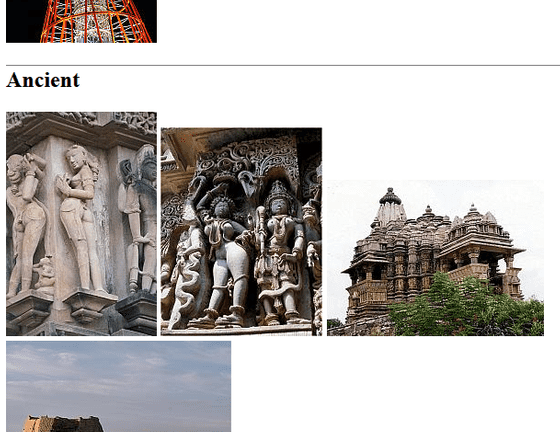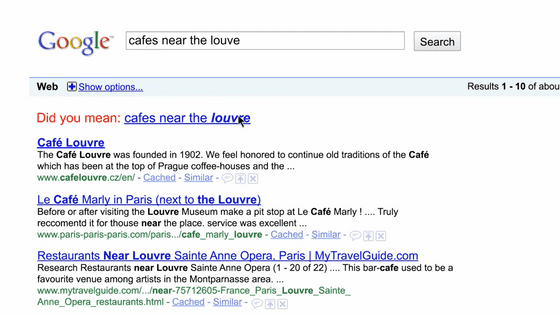41 Google failures and mysterious initiatives from a programmer's perspective

Google, a major technology company, has made many changes over the years that have been called 'bad changes' or 'mistakes.' Programmer Xah Lee summarizes Google's failures.
Google Crimes

YouTube will begin testing to prohibit the use of ad blockers around May 2023, and crackdowns will begin in earnest from October 2023. This initiative has been criticized because the only fundamental solution is to subscribe to YouTube Premium, a paid subscription that removes ads from YouTube.
YouTube starts blocking 'Adblock Plus' which erases advertisements, causing chaos, Adblock Plus official also starts responding - GIGAZINE

It has been reported that Google is intentionally excluding old pages from more than 10 years ago from search results, as well as intentionally adjusting the suggestions after you type a word into the search box. It has been reported that. The image below is a suggestion about former US senator Hillary Clinton . A Google search will show up words like 'emoji' and 'employment.'

On the other hand, in another browser, you can see the words 'emails' and 'emails investigation' following the Clinton

◆3: Removed “sort by date” function on YouTube
In November 2022, YouTube implemented an update that removed the ability to sort videos on YouTube channels in chronological order.
It is confirmed that ``sorting by oldest'' is no longer possible with YouTube update - GIGAZINE

This change received a lot of negative feedback.

The 'Sort by oldest' function was returned to YouTube in June 2023.
Since 2012, Google has been selling 'sponsored' options for displaying ads at the top of search results. Google once pointed out that this feature was ``evil,'' but as a result, Google also introduced this initiative.
◆5: Interference with competing browser “Firefox”
Many people have pointed out that Google, which provides the web browser ``Chrome,'' intentionally lowers the performance of some sites such as Gmail and YouTube compared to its competing browser Firefox.
It has been pointed out that YouTube is intentionally slowing down the video loading speed of Firefox and Edge users - GIGAZINE

In 2018, when trying to watch a video on YouTube using Microsoft's web browser 'Edge', a 'div' message was displayed and the video could not be viewed. It has been pointed out that Google did not provide a detailed explanation on this matter.
◆7: Introduction of AMP
In 2019, Google introduced AMP to speed up website browsing. If you do not implement AMP on your site, it will be moved to the bottom of Google search results. On the other hand, it has been reported that the loading speed of the site has become slower with the introduction of AMP, which has been criticized .
Google added a 1 second delay to the loading time of non-AMP ads - GIGAZINE

With Chrome, you can share your work on another device by logging in to your Google account. However, it has been pointed out that Google can track the pages viewed by users logged in to Chrome, and that information may be leaked to Google.
◆9: Force use of HTTPS
Google basically recommends using ' HTTPS ' which has better encryption than HTTP communication. When viewing a site using HTTP in Chrome, the message 'Unsecured communication' or 'Connection is not secure' may be displayed . On the other hand, Google has been criticized for threatening to change from HTTP to HTTPS, even though it is not easy to do so.

Since 2016, when you view an email sent to Google's email app Gmail, the sender receives a message indicating that the recipient has viewed the email. This feature runs even if you turn off HTML.
◆11: Claim on Google Fonts
Mr. Lee points out that ' Google Fonts ', which provides fonts used by Google, is carrying out propaganda based on Western ideology. In addition, an example of Japanese text in Google Fonts uses a passage from the Universal Declaration of Human Rights that reads, 'We recognize the inherent dignity and equal and inalienable rights of all members of human society.' .
◆12: Hide the number of negative ratings on YouTube
In November 2021, YouTube took steps to hide the number of 'dislikes' for videos. According to Google, by hiding the number of negative reviews, it will reduce the damage caused by ``low rating attacks'' where people repeatedly press the negative rating button. On the other hand, some users have criticized the hiding of low ratings.
The number of 'low ratings' on YouTube is hidden - GIGAZINE

◆13: Stopping the mechanism for hiding related videos on YouTube
In the past, YouTube allowed you to hide related videos by adding the keyword 'rel=0' to the URL. However, this feature was removed with the YouTube API update in September 2018.
◆14: Blocking Thunderbird by Gmail
Since 2014, Gmail has blocked Mozilla's email software ``Thunderbird'' from accessing Gmail. To resolve this, some security features must be turned off in Google's settings, which has been criticized .
◆15: Use of Google+ by Google employees
Google+ , a social networking service formerly operated by Google, featured posts by Google employees introducing new features and useful features of Google+. On the other hand, since the majority of posts were ones that gave Google a good impression, Lee said, ``I think there may have been pressure on employees not to make negative posts.'' points out.
◆16: Fraudulent advertisement received in Gmail's 'Promotions'
In addition to the regular inbox 'Primary' and 'Social' where emails received from SNS platforms are categorized, Gmail has a tab called 'Promotions' that receives direct mail etc. It has been reported that this 'Promotions' tab is receiving advertisements from sites that you do not remember registering with. Google has been using this advertising method since around 2013.

As mentioned above, Google is working on measures such as intentionally lowering the performance of its competing web browser, Firefox, in order to expand the market share of its web browser, Chrome. The battle over Chrome and Firefox started around 2011.
◆18: Lies about the private browsing function
The ``Private Browsing feature'' introduced by Google around 2008 is provided with the promise that ``you can visit sites without anyone knowing.'' However, the reality is that simply deleting the browsing history of the browser on your computer does not hide the fact that you have ``accessed the site.'' Lee points out, ``Private browsing is only useful if you share your computer with someone and don't want them to see the sites you visit.''
◆19: Problem with Blogger account
Around 2008, a problem occurred in Blogger , a rental blog service provided by Google, where links were not functioning properly.
◆20: 'Don't be evil' code of conduct
At Google, we have included the phrase ' Don't be evil ' in our corporate code of conduct. However, Google has been criticized for refusing to introduce support for browsers and servers that prevent tracking and refusing to provide customer support in order to maximize advertising profits. You may take such actions. As a result, there has been a lot of debate about the code of conduct, ``Don't be evil.'' The phrase 'Don't be evil' was removed from the Code of Conduct in 2018.
It turns out that Google's new code of conduct has been released from 'Don't be Evil' to 'Do the Right Thing' - GIGAZINE

Google has been providing the content-linked ad distribution service ' Google AdSense ' since 2003, and with the exception of adult-related and violent sites, content-linked ads and search-related ads are automatically displayed on sites. will be distributed. However, Google has sent Adsense ban notices to pages that post images of sculptures depicting ancient Asian goddesses.

Google's SNS 'Google+' was launched in June 2011, but was shut down on April 2, 2019 due to low usage. In addition, at that time, a vulnerability was discovered in Google+ that could cause the information of more than 50 million users to be leaked.
Google+ closure decided on April 2, 2019, time schedule until shutdown released - GIGAZINE

◆23: Incorrect Google ad settings
Ads posted by Google can be adjusted using the ' My Ad Center '. However, Mr. Lee points out that some of the information displayed on My Ad Center does not match his true interests.
◆24: Use of “-(hyphen)”
Many developers and programmers use '_ (underbar)' to separate characters in file names. However, Google uses hyphens instead of underscores. If you replace underscores with hyphens to match Google, it will not be able to process information correctly.
◆25: Accusation by Steve Yegge
In the Google Platforms Rant posted in 2011 by Steve Yegge , a former Google and Amazon developer, he strongly points out the reasons why Google and Amazon are promoting microservices when developing cloud platforms and the problems faced by their companies. doing.
◆26: JavaScript and cookie requests
Since 2012, the introduction of JavaScript has become mandatory for Google Groups . If you have JavaScript turned off, your content will not be displayed in Google Groups. Similarly, JavaScript is required for some pages, Google Translate, and Google Image Search. Additionally, if you use a dynamic interface in Blogger, cookies must be turned on.
◆27: Delivery of code containing invalid HTML
When Google+ launched, Google distributed code to add social media sharing buttons to your site. It has been pointed out that the code contained instructions to add invalid HTML. Part of the code is below.
[code]
◆28: Gmail warning about state-sponsored attacks
In June 2012, Google displayed a warning to some users saying, ``A nation-state-targeted attacker may be attempting to compromise your account or computer.'' According to Lee, the warning continued to appear even after turning on Google's two-step verification.

If you're worried about your Gmail account being deleted, go to the 'Forwarding and POP/IMAP' link and select 'Enable IMAP.' It is possible to save emails locally. You can also save other data besides Gmail locally by accessing Google Data Export .
◆30: Introduction of Google side wiki
In 2009, Google implemented a feature called ' Google Sidewiki ' that allowed all users to leave comments on any website. However, Google Sidewiki has been criticized due to problems such as vandalism. However, the only way to delete a Google side wiki is to use ``URL redirect'', which caused many users to worry.
◆31: Introduction of HTML attribute value “nofollow”
The HTML attribute value 'rel=' nofollow ', developed by Google in 2005, instructs Google's crawlers not to follow links. Lee points out that ``nofollow'' is ``a gimmicky byproduct designed solely for Google's benefit that strays from the goals of HTML as a form of communication.''
◆32: Deterioration of quality as a search engine
It has been pointed out that sites containing many paid links have been listed at the top of Google searches for several months, and that spam sites are ranked at the top of search results. Lee recommends moving to a 'decentralized open source search engine.'
◆33: Mysterious account suspension by Google
In March 2011, Mr. Lee's Google account was suspended for four hours. According to Google, Mr. Lee's account was suspended due to ``abnormal activity,'' and Mr. Lee said, ``I have no idea.'' You will also need to submit your phone number to our anti-spam system to recover your account. Mr. Lee said, ``I don't want to give my phone number to Google.''
◆34: SEO advice from Google
Google provides a variety of SEO information for webmasters, including ``How to rank your website.'' Google claims that it 'helps webmasters create high-quality websites by providing advice on SEO,' but Lee says, 'Google uses questionable tricks such as link manipulation and spam links.' 'They cleverly hide their existence.'

Mr. Lee points out the factors to be displayed at the top of search results in search engines: ``anchor text that focuses on keywords from external links,'' ``popularity of external links,'' ``diversity of link sources,'' and ``title tags.'' 'Use keywords from that page.'
◆36: Conflict between web browsers over SPDY protocol
Google had proposed a communication protocol called ' SPDY ' with the aim of replacing HTTP. Although it is possible to shorten the loading time of web pages by using SPDY, the battle for market share among web browsers that support communication using SPDY has become even more heated.
◆37: Distribution of invalid HTML tags
As of January 2011, the code for embedding YouTube videos contained unnecessary 'type='text/html'. Mr. Lee pointed out this problem on Google's YouTube forum, and it was reported that Google fixed it in February 2011 and the embed code no longer includes 'type='text/html''.
◆38: Is Google a company worth trusting?
Mr. Lee, who has watched Google's growth since its founding in 1998, says, ``Google's products and services are significantly safer and better than our competitors, and are worthy of trust.'' He also points out that when a company grows into the largest company in the industry, it is labeled as a 'monopoly' and is subject to various attacks.
◆39: Blogger's adult content policy
With some exceptions, Blogger allows the posting of adult content such as images and videos that include nudity or sexual acts. If you want to post adult content, you need to check the 'Adult' box in your blog settings.
◆40: Songs related to Google+
Google+ was suffering from problems such as the risk of personal information leaks and a decrease in the number of users due to other SNS, and various songs and raps were created with a meaning of criticism. The video below is one of them.
The Google+ Rap - YouTube
◆41: Love for Paris in Google commercials
In the commercials that Google has aired so far, examples of searches related to Paris often appear, such as ``study abroad in Paris, France,'' ``chocolate shops in Paris, France,'' and ``cafes near the Louvre Museum.''

Related Posts:
in Video, Software, Web Service, Posted by log1r_ut







